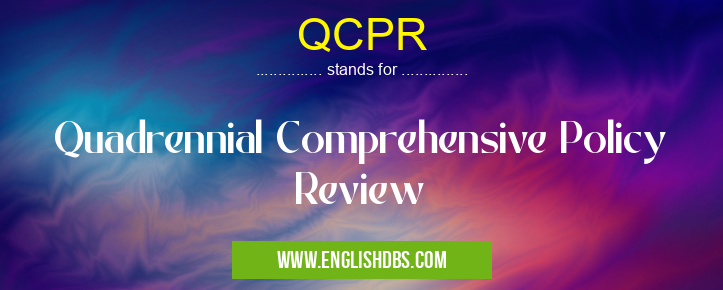What does QCPR mean in UNCLASSIFIED
In the world of international relations, acronyms and abbreviations are often used to talk about complex policies or procedures. One such acronym is QCPR, which stands for Quadrennial Comprehensive Policy Review. This review is an important meeting that takes place every four years to assess the progress made in implementing foreign policy initiatives set out by the United Nations General Assembly (UNGA). Through this review, countries can discuss their successes and shortcomings when it comes to international development goals, as well as plans for a better future.

QCPR meaning in Unclassified in Miscellaneous
QCPR mostly used in an acronym Unclassified in Category Miscellaneous that means Quadrennial Comprehensive Policy Review
Shorthand: QCPR,
Full Form: Quadrennial Comprehensive Policy Review
For more information of "Quadrennial Comprehensive Policy Review", see the section below.
Role of QCPR
The role of the QCPR is essential because it provides both an overall picture of how far we have come since 2000 across all international development goals as well as indicating what needs improving or addressing in the near future. At each review period countries come together to evaluate progress made on specific targets related to poverty reduction, gender equality, education access or health care access. This information then feeds into decisions that will shape governmental strategies moving forward over the next four-year period. Further, the QCPR ensures that activities aiming at sustainable objectives are coordinated with one another so as not to inadvertently duplicate efforts or compete against each other – resulting in greater efficiency when addressing pressing issues like poverty reduction or gender empowerment worldwide. By providing up-to-date information about performance levels within each country’s jurisdiction, decision makers are able better tailor aid programs more effectively; reducing waste while maximizing impact simultaneously.
Essential Questions and Answers on Quadrennial Comprehensive Policy Review in "MISCELLANEOUS»UNFILED"
What is a Quadrennial Comprehensive Policy Review?
The Quadrennial Comprehensive Policy Review (QCPR) is an international process that focuses on the management of resources and operations at the United Nations. The review is undertaken every four years, and assesses how effectively the UN’s work plan is being implemented, as well as how worthwhile the activities are in achieving the organization's objectives.
Who oversees the QCPR?
The QCPR is overseen by the General Assembly of the United Nations. It has created a working group to consider collective policy and resource decisions that can improve and streamline the work of all UN organizations, programs, funds, offices, entities, agencies and other bodies.
How does the QCPR respond to global challenges?
The QCPR seeks to identify opportunities to better address pressing global challenges through more effective coordination among different parts of the UN system. This includes proposing ways to strengthen existing partnerships with external stakeholders such as civil society organizations or companies for greater impact and efficiency.
What areas are included in a QCPR assessment?
A comprehensive policy review covers all aspects of UN operations, from delivering program results to managing resources. It takes into account issues such as security, development, human rights and humanitarian assistance; gender equality; knowledge sharing and capacity building; increased accountability; private sector engagement; inter-agency collaboration; sustainable financing options; regional perspectives; country-level performance assessments; technology integration etc.
What does a successful QCPR look like?
A successful QCPR should result in concrete outcomes which could include enhanced operational performance of UN agencies or improved policy coherence across various parts of the system. More broadly speaking though it should also lead to better use of resources so that these can be channelled towards achieving tangible results on the ground where they are needed most.
Who is involved in formulating proposals for QCPR initiatives?
Proposals for initiatives stemming from a QCPR are formulated collaboratively by representatives from different branches of UN members states including government ministries, universities and research institutions as well as technical experts from relevant sectors such as civil society bodies or public health authorities etc., who offer their insights on key topics related to their field.
How long does it take to complete a Quadrennial Comprehensive Policy Review?
Depending on its complexity, it can take up to one year or longer for each cycle before any action plans arising out of a QCPF can be implemented effectively across different parts of the UN system. During this period negotiators meet regularly with representatives from member states and other relevant stakeholders before coming up with concrete recommendations which become part of an action plan adopted by countries during a particular session at General Assembly level.
Does everyone agree with all outcomes proposed from a Quadrennial Comprehensive Policy Review?
Although there may be some disagreements concerning specific points raised in a proposal draft following negotiations between representatives from member states during a given session at General Assembly level there usually tends to be considerable consensus around conclusions reached through an overall assessment backed up by solid evidence presented by experts on different topics discussed.
Final Words:
In conclusion, Quadrennial Comprehensive Policy Review (QCPR) serves an important purpose in keeping countries accountable when it comes to tackling international development agendas such as poverty alleviation and gender equality initiatives around the globe. This platform allows countries from all over the world share experiences, best practices, lessons learnt whiles ensuring coordination between different activities by individual country actors striving towards common international objectives - thus enabling us all work together towards shaping a better world for everyone!
